Whether It’s Legal or Not, Is It a Good Idea?
New RV owners and veterans alike can often struggle to agree on this question: is it legal to drive with your propane on? In addition, each state has its own set of laws, which is inconvenient for travelers who frequently cross state lines.
One of the rules people seem to be divided on is whether you can legally drive with your propane tanks open. But the question isn’t as simple as whether it’s legal or not. Is it a good idea?
THINGS IN YOUR RV THAT USE PROPANE
Propane is an essential gas for operating specific appliances in your camper. Luckily, propane is also considered by many states to be a green energy thanks to its low emissions. It’s also more cost-efficient than electricity.
Note: While the emissions are much lower than other fuel sources, propane is not pollution free or 100% clean burning. When burned, it emits CO2 and CO gasses (which are deadly when they aren’t ventilated and build up) and should, therefore, not be burned in an enclosed space without proper ventilation. It is also imperative that the CO2/CO alarm in your rig is up to date, working, and regularly tested when any propane applications will be used for any reason.
Propane can run the following devices in your RV:
- Refrigerator: To keep the fridge cool, a propane flame is used to trigger a chemical reaction that absorbs the heat.
- Stove Top/Oven: Similar to a gas stove, it connects to a propane line that connects to the burners on top and the oven. Propane heats up faster than natural gas.
- Furnace: A propane heater will burn propane to create warm air, which is then distributed throughout your RV.
- Water heater: Both regular and tankless propane water heaters are available for RVs. Tankless can be more expensive initially but offer endless hot water.
- Generator: Most generators operate on gas, but propane generators are also available. While less efficient, it releases fewer pollutants into the air.
Is Propane Dangerous?
Liquified petroleum gas, “propane,” is an energy source considered clean and efficient compared to others. When stored inside a tank, it’s turned into a liquid through high pressure that causes the temperature to rise above 80 degrees Fahrenheit. This is the best way to store propane because it comes very condensed, making it easier to transport large amounts.
When the liquid propane is released from the tank, it combines with heat to turn into gas. While this is fine under a controlled flow, it also contributes to the highly flammable nature of propane. Because liquid propane would cause immediate frostbite and even a tiny spark could ignite a gas leak, propane can be considered dangerous and should always be handled carefully. However, if you follow safety guidelines, using propane is perfectly safe.
Is it Legal to Drive an RV with the Propane On?
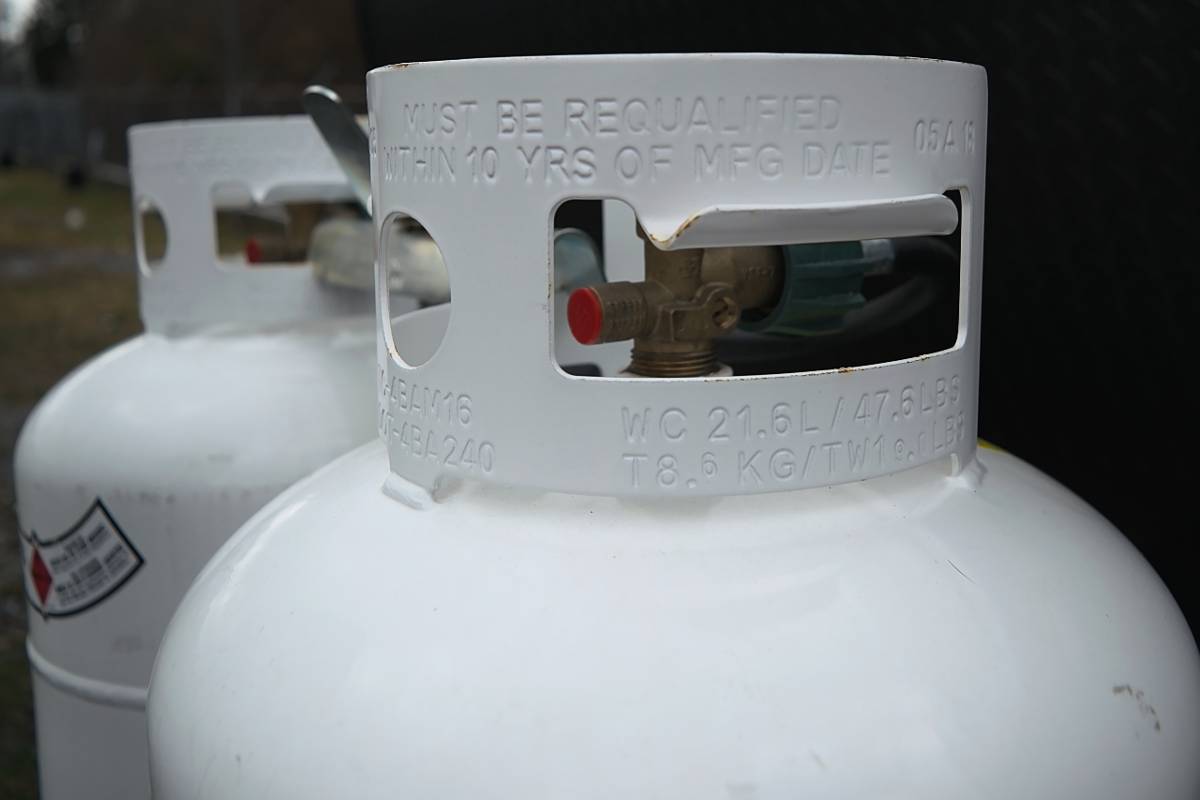
If you ask a room full of experienced RV travelers whether they leave their propane on when driving or opt for turning it off, you’ll get answers all across the board. Except for certain situations, there are no laws against driving with your RV’s propane tank on in everyday situations.
Just because it isn’t illegal to do so doesn’t mean that it’s a good idea. As mentioned above, propane can be very dangerous without proper care. Unfortunately, even if you take every precaution, accidents can still happen when driving. For this reason, many people decide it’s better safe than sorry and turn off their propane tanks whenever their rig leaves RV parks.
Dangers of Driving a Propane Tank While On
The most considerable risk that propane tanks present are unnoticed leaks. Your risk of propane leaks increases when you are driving your RV.
Other events while driving could also cause propane leaks like a tire blowout, or hitting a pothole can all cause a leak. Once you have a propane leak, the smallest sparks could cause an explosion.
The worst thing that could happen when driving with your propane tank open is an accident that results in flames. However, even when a propane tank is subject to extreme heat, there are safety measures to prevent an explosion. While propane tank explosions are not super common, they may be possible with perfect conditions.
Why Do People Drive An RV with the Propane On?
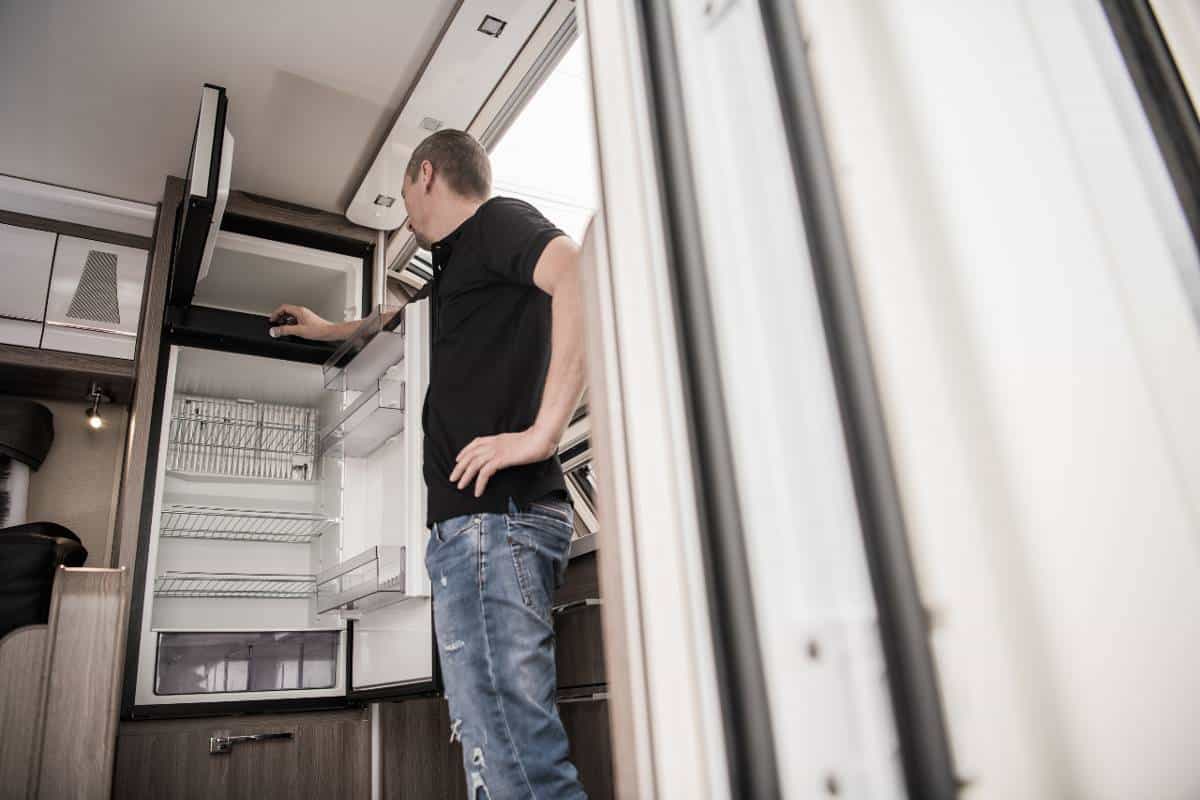
It seems that however rare these accidents may be, for many, it makes more sense to simply turn off your propane every time you move your camper. So why are some RVers so set on leaving it on?
The main reason to leave your propane valve open is to keep your refrigerator cold, which is pretty important, especially if you’ve just loaded it up with enough food for a few weeks. While RV fridges do have a number of safety features built-in, this reward does not outweigh the risk for most of us. Plus, there are plenty of alternatives for keeping your food cold:
- Keep the refrigerator closed: For short trips, avoid opening your refrigerator once you unplug it, and the food should stay cold. You can also freeze certain items, which will, in turn, keep other things colder for longer.
- Pack perishables into a cooler: Before you leave, take out anything you’re worried may go bad and pack them into a cooler with ice.
- Swap your propane fridge for a fully electric model: An electric fridge that can run off your RV’s battery poses fewer risks than running off propane.
Rules for Propane Tanks
While there is no national law about driving with propane tanks open, there are rules in place for specific situations. If you decide to drive with your valve open, always check state and local laws when visiting somewhere you’re unfamiliar with and keep your eyes open for any signs that restrict access.
- Close propane tank valves at gas stations: Always close the propane valve before pulling into a gas station to fill up. Propane refrigerators have an open flame and therefore make a dangerous combination with gasoline fumes.
- Look for signs near tunnels, bridges, and ferries: Many states have laws regarding traveling on tunnels, bridges, and ferries with propane tank valves in the open position. For example, the Washburn Tunnel in Houston requires that all propane tanks be closed when in the tunnel.
- Check state regulations for open propane valves: Some states don’t allow open propane tanks at all. New Jersey requires all cylinders to be in the closed position when driving on open highways.
- Consider alternative routes for strict regulations: Other tunnels ban propane tanks altogether. For example, the Baltimore Harbor Tunnel doesn’t allow any vehicles hauling bottled propane or other hazardous materials to drive through.
Minimizing the Risk of A Propane Leak
While leaks are easily detectable inside due to the odorant put in propane, leaks outside the RV can go undetected as wind dissipates and blows the gas away. In some cases, tiny micro leaks go undiscovered for a while. This is not only potentially dangerous but costs money by draining your propane.
Have a Good Propane Alarm Near the Floor
Even though propane is made to smell so we detect it, it’s heavier than air so a slow leak may not be detected until enough of it builds up on the floor, especially at night when we aren’t moving around to stir everything up. A working propane alarm located at floor level will warn us of a possible propane leak before our noses do. It can be a lifesaver for your pets, who live much closer to the floor than we do as well.
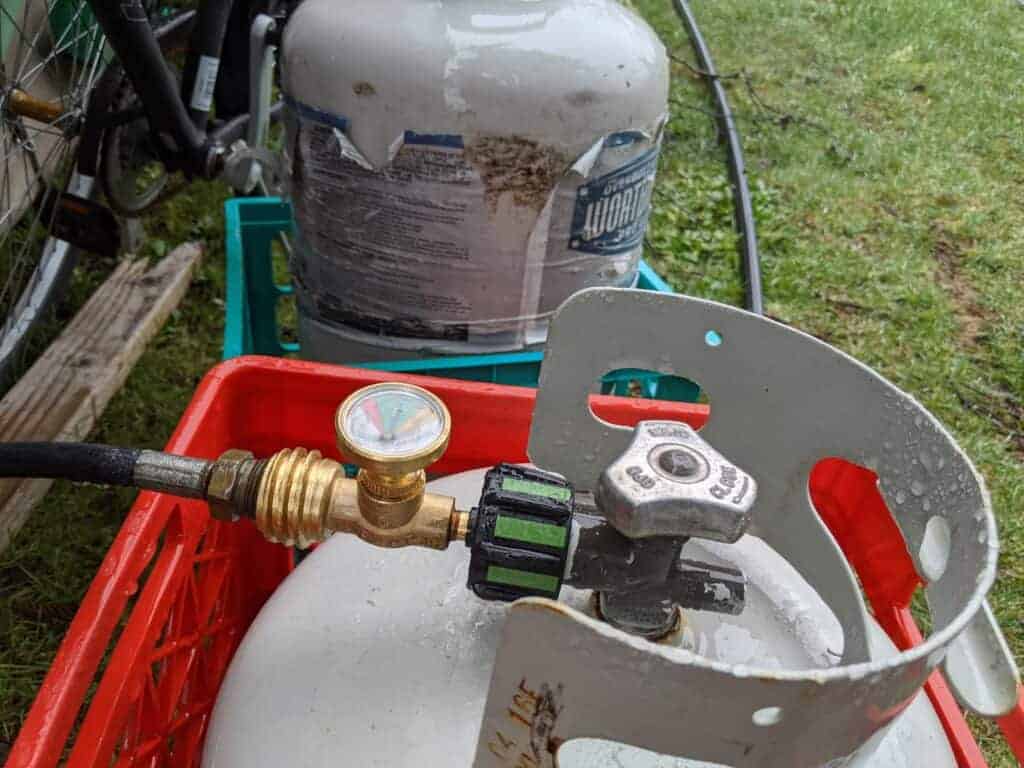
Use An Emergency Shut-Off Device Like GasStop
GasStop is a great product that is easy to install and will instantly shut off the supply of propane in the event of a major leak or regulator failure. Say, for example, you are driving down the road debris ruptures a propane line. Whether you turn your propane off or leave it on while driving, there will be a significant leak when the tank is turned on. GasStop will detect this leak and automatically shut the gas flow off at the tank to prevent dangerous gas buildup and wasted propane.
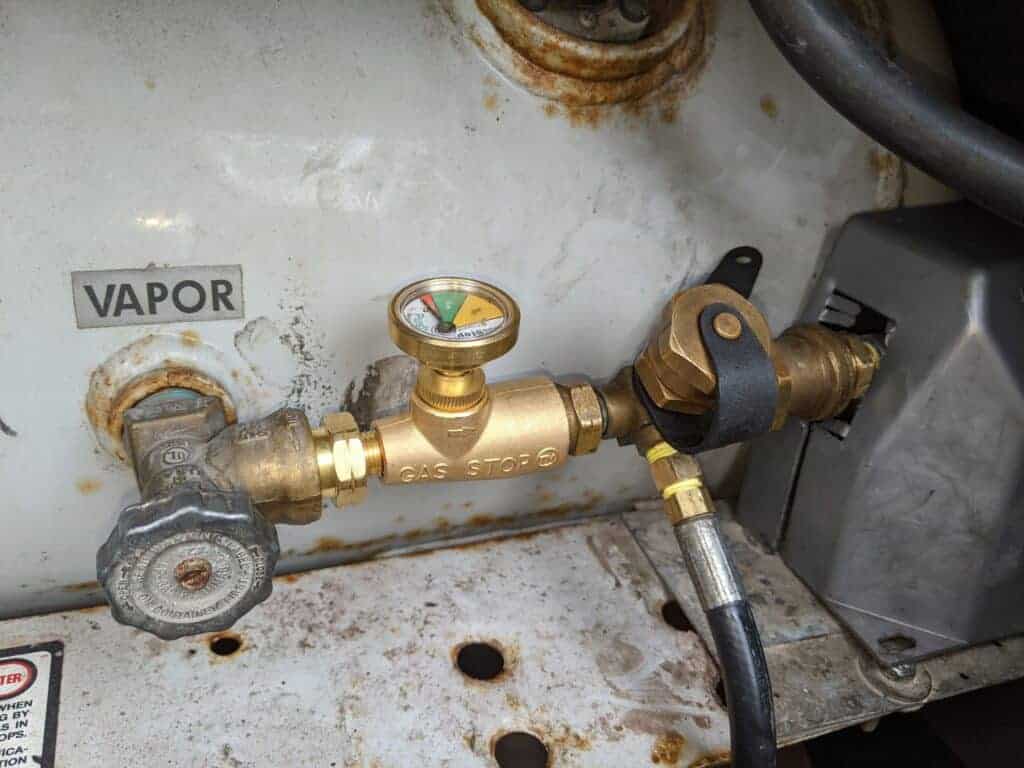
GasStop can also be used to test for minor leaks before use so it’s an overall excellent propane safety device. You can learn more about GasStop on their official site.
So, It’s not Illegal to Drive with the Propane on, but Should you?
So, it’s not illegal to drive an RV with the propane on, but should you? RVers may never come to an agreement on this but keeping your propane tank valve closed while you’re hauling your RV is the safest. For propane safety tips, check out this article from Do It Yourself RV.
Are you team open tanks or team closed tanks?

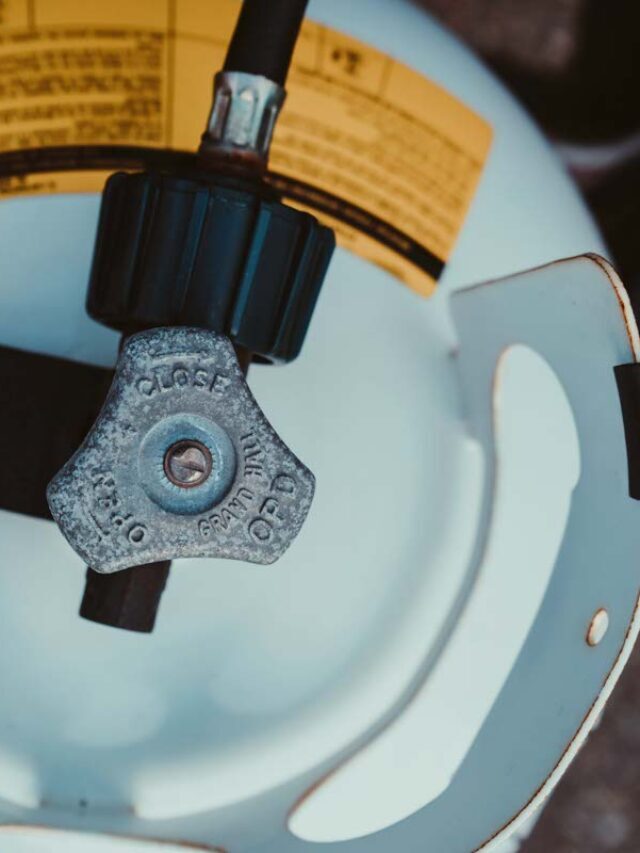
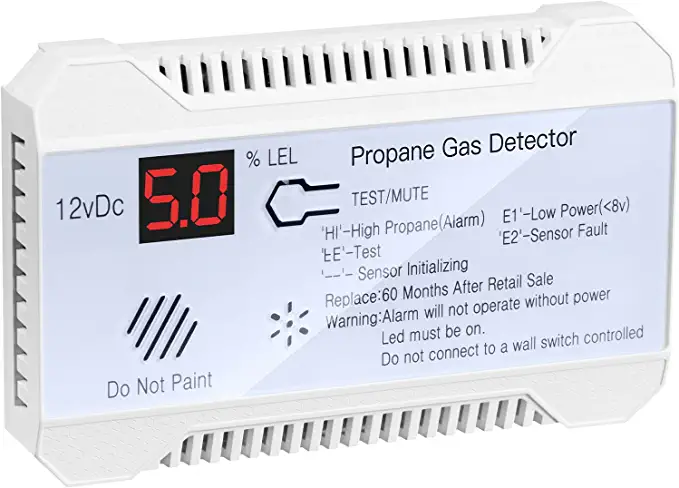


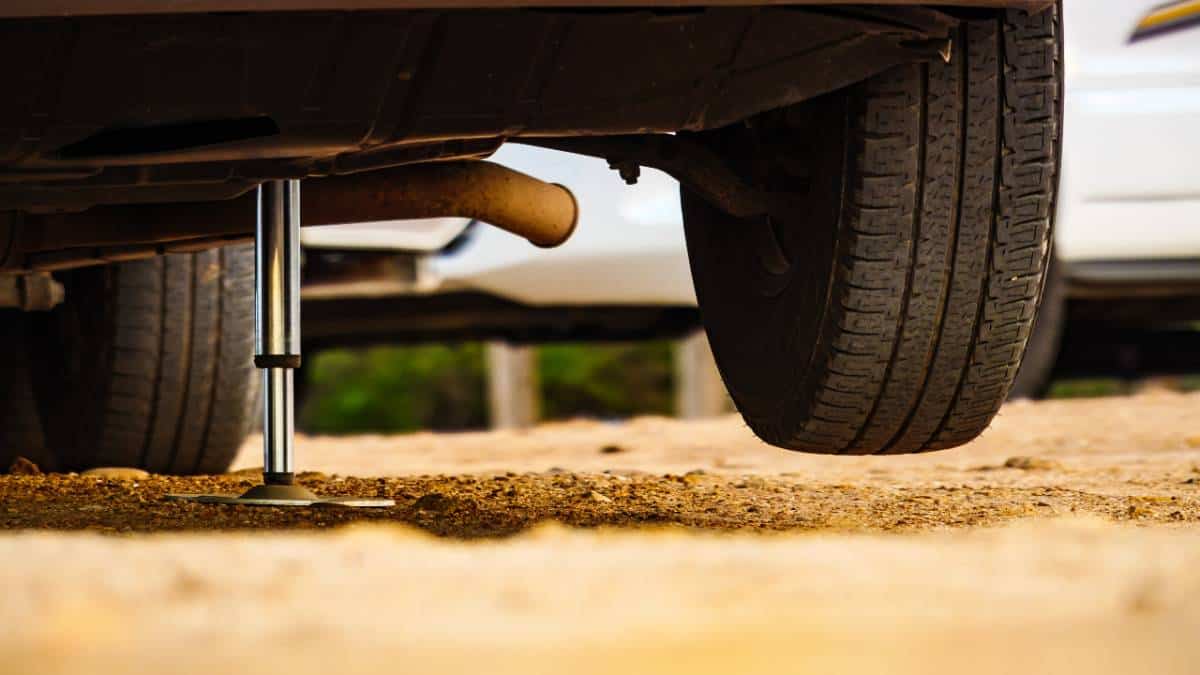

The author conveniently forgets that all concentrated energy storage can cause nasty accidents. This includes the open flow of gasoline to your vehicle’s motor, the LiFePO battery which goes into thermal runaway, and even lead acid batteries when hit with a short circuit. Each energy storage system, as it matures, has safety precautions embedded. But that doesn’t prevent all accidents where the energy is no longer contained.
Trailering with propane on has a useful function – running the fridge. With appropriate precautions, propane has a lower accident rate than the not-yet-fully-mature LiFePO battery charging systems powering a 12V compressor fridge.
That is completely untrue. LiFePO4 batteries are a very safe technology, and has been around for 50 years. It only became popular in the last 6-7 years for RVs. I have installed over 600 Li batteries in over 200 RVs without a single problem in over 6 years. I have converted dozens of propane fridges to the new 12V compressor fridges, and EVERY owner is very happy with the new fridge.
Propane is known as the sneaky killer, because it sits and waits for you to make a mistake. That being said, it is still a great product for RVing, Depending on what vehicle you have, tow behind, 5th wheel, or motorhome, and the kind of refrigerator, electric, propane, or the combination 12v, 120v, and propane, it could be an encumbrance to shut off your propane particularly if you are traveling the length of a state the size of New Jersey. At times, we’ve traveled with ice in our ice chest cooler for such journeys. Moreover, we travel in a class “C”, being where the action is, so to speak (lol), and have, in my opinion a better chance of knowing with is going on and a faster response, if something does occur.
I have had a motorhome since 1985, have been in 49 states & 10 canadian proviences. I have always left propane tank on. That’s why you have a dual energy refrigerator.
Right on
In Canada the Dangerous Goods Federal regulation makes it illegal to tow a trailer with the LP turned on, that is a Federal regulation. Most provinces, especially BC have published guidlines regarding towing trailers, the BC regulation prohibits towing a trailer with the LP on. Also as BC has compulsary Auto Insurance it is likely that should you be in an accident your insurance could be voided.
That in incorrect. https://www.drivesmartbc.ca/rvs/operating-rvs-propane
daddy always said, “Just because something is possible, doesn’t mean it should be done.” Sadly, common sense is very uncommon today.
I agree..We have an RV and would not travel with the Propane gas NO…JUST because you can…dies not mean it is SAFE…MAY NOT BE YOU THAT HITS YOUR RV. WHAT ABOUT AND ANIMAL OR A DRUNK DRIVER….IT HAPPENS ALL THE TIMR..
I don’t turn off my propane tank and never had for many years. If you decide to do so it’s ok. Just make sure that the water heater is turned off. If the water heater is on with the gas supply off it will try to ignite and failure to accomplish ignition will place the appliance into a lock out mode. The average person doesn’t know how to reset it. I’m a retired major appliance repairman and instructor and a gas leak will be immediately noticed. Lp gas is odorless, however, the gas refinery company adds an extremely strong chemical substance called “mercaptan” witch will alert the person inside the coach. In the event of an accident, it won’t matter weather is turned off or not.
It’s just my opinion.
Every RVer should know to reset your water heater you just turn it off and then back on. Reset accomplished. Not rocket science.
Agree
A lot of RV gas appliances have a thermal coupler, if the flame gets blown out the thermal coupler gets cold and then it shuts off the gas to that appliance. Sometimes depending on how they are manufactured it will still try to re-ignite. The thing that frustrates me the most is people that have RVs don’t know how to check for leaks in the gas system nor will they pay somebody that knows how to do it to make sure that the system is completely safe to operate. Keep in mind one liquid gallon of propane in the tank will expand to 270 gallons of explosive vapor if there’s a leak in the system. 25 gallons of propane in the tank is liquid while it’s in the tank but if that 25 gallons has leaked into the atmosphere or inside of the coach that 6750 gallons of explosive vapor
A lot of people don’t understand the expansion rate of propane.
Thanks yes I keep my valve on because our trip to property is 4 hours away. Like to keep food at a good temperature. And we don’t have to stop for any fuel so try to stay safe. Need all the help we can get in Arizona weather! Thanks!
I’m so sick of reading these articles trying to scare new RVers about the propane onboard their RVs. They are specifically designed to run, while driving down the road, on propane. Millions and millions of miles are traveled every year with the propane on and the fridge on. You are about 10x more likely to have a fire from the gas (or diesel) fuel system than from propane. Stop it! The only time you should turn off the propane is when you are refueling (or some tunnels that require it).
I was tempted to let your comment pass, but your statement that RVs are designed to run down the road with propane on is misleading. Propane is an excellent energy source, but the chance of something going wrong is a hundred times higher than the chance of a catastrophic electric failure from a battery.
Most tunnels (at least in north/central east coast) do not allow RVs with propane tanks…whether open or closed. You’ll be detoured to a bridge or alternate route.
The main feed line runs along the frame underneath most travel trailers – just onboard of the wheels. A tire blowout with a piece of flapping belt can easily cause a good leak, and plenty of sparks. The propane cylinders are designed to take a lot of abuse in an accident before rupturing. Best to travel with the valve closed. Had not considered the open flame in the refrigerator. That is an even more compelling argument for turning the frige off. Gasoline generates vapor at MINUS 45 F. If I see someone smoking at a gas station, I leave immediately.
Usually newer tanks have an excessive flow valve which detects a rupture in the line causing excessive gas flow resulting in the valve to internally shut down.
We have a 2011 Tiffin Phaeton and the cabin gets really cold driving in the winter despite blasting the heater on high. The dealer/Tiffin suggest we turn on the propane furnace while the vehicle is in motion to keep the cabin warm, which is at odds with many who believes that’s a no no. Go figure!
We usually drive with our propane valve open and our absorption refrigerator cooling on propane. We often do turn of the fridge when fueling (but not every time, we forget once in a while). We have had this RV since April 2012 and feel it is safe.
Propane, a non-renewable hydrocarbon, is absolutely not considered a “green” fuel.
Hi,
Thanks for reading. While you are absolutely correct that propane is a non-renewable hydrocarbon (we can’t make more in the short term once it’s gone). The renewableness of a fuel is not the only category that groups and government agencies use to label something as clean or green. The green fuel label was given for the following reasons:
The EPA lists propane as a “Clean Alternative Fuel.”
Propane is nontoxic and produces minimal emissions, according to the Propane Education & Research Council
It is harmless to soil and groundwater.
Propane is one of the most efficient fuels that exist with many propane appliances being 95% efficient.
Propane is drastically lower in carbon emissions that contribute to climate change than other fuels available.
We hope that clarifies why the article labels propane as “green.”
Thanks again for being a Camper Smarts reader, and we appreciate your comment.
Thanks for the comprehensive reply Levi. The EPA source you noted that refers to propane as “Clean” specifically states that it has “cleaner” chemical properties relative to conventional gasoline” – this is true. Perhaps the EPA should consider calling propane a “Cleaner Alternative Fuel” rather than expressly a Clean Alternative Fuel. Propane is a hydrocarbon and when combusted produces CO, CO2 and NOx byproducts. Your readers may interpret the adjectives green and clean to literally mean clean combustion and use the propane burner in a closed RV on cold night for heating purposes. Many people die each year in RV from carbon monoxide poisoning and asphyxiation believing it burns clean. There is nothing clean or green about propane.
On an related note, in the late 19080s my friend was working at a gas station fueling up an RV. There was a pin-hole leak in the filler hose that was ignited by the propane refrigerator flame. 80% of his body sustained 3rd degree burns from his chin down. Please always turn off your fridge when fueling.
Very good points. I have added a subsequent note to the article to ensure no one makes any incorrect assumptions about burning propane inside based on the “green” label.
Read this information at the link below.
People have been using propane forever.
As this article points out propane has been demonized for years and depicted in movies as exploding on impact. This is not true.
Should you drive with it on? If you want to run your propane generator, yes. How is running your generator on propane any more risky than running your gasoline or diesel generator with the engine on? In my opinion, it’s no different…. make up your own mind.
Driving any vehicle is a risk that we all have agreed to accept.
https://www.propane101.com/explodingpropanetanks.htm
100%. Do as you feel safe and i will do as i feel safe. Every time any person moves they take risks. When driving a vehicle at high speeds that anything could happen at any time you increase those risks. The faster you drive the higher the risk. We willingly take these risks with 0 force. Hell most love it and wont stop even after a accident. But yet we blame others any way we can and not accept personal risk. If by slim chance bad happens just chalk it up as lesson learned and if still alive carry on. Re asses risk and carry on. If a 40 year habbit and 1 minor issue then low risk factor carry on. If dead oh well dead and no longer care either way.
Your article is full of if’s and it can which will make any statement correct while instilling fear and doubt in the reader. You don’t state that the fridge turns itself off if it doesn’t relight. All propane appliances have safety features to self protect.
Will most refrigerators run off your battery power?
Yes and no. The refrigerator’s control board and propane ignition will work off 12V DC. And pretty much all RV refrigerators (unless the RV came with a residential refrigerator) have a “Gas” setting. The propane is actually heating up the refrigerant (ammonia mixed with water) inside a boiler to the point that it turns into gas. When running off AC power, the fridge uses electricity to heat the solution, while most RV fridges use propane as the heating element when running off the battery. There are RV fridges on the market that are truly 12VDC powered. However, these fridges run using a compressor system similar to a residential fridge rather than the absorption method of the standard two-way RV fridge.
Thanks for being a Camper Smarts Reader.
One thing that I think people should know about when it comes to RVs and propane is the understanding of how the propane system really works. Let’s say that you have one liquid gallon of propane in the tank. One liquid gallon of propane will expand to 270 gallons of explosive vapor if your system has a leak in it. 30 gallons of propane in the tank will expand to 8100 gallons of explosive vapor if you have a leak in the system. Most people don’t bother having their propane system checked out for leaks. It doesn’t take that long for somebody that knows what they’re doing to check an RV propane system to make sure it does not have leaks and it’s operating at the correct pressure.
The propane pressure on the output of the regulator is about 11 inches of water column. Propane is not measured in pounds per square inch. Anybody that’s a qualified RV technician will understand the operating pressures of a propane system. Several years ago I did a complete RV inspection on an RV that was involved in a lawsuit. The RV dealer provided a document that I requested under a subpoena to get me the pre delivery inspection/safety inspection open RV that was involved in a lawsuit. They created one this document that I had the lawyer subpoena. It took me only seconds to tell that it was a fabricated document with a forged RV technician’s signature on it.
The lawyer that was representing the RV dealership questioning me in front of a judge in a jury telling me how can I determine that a signature is forged. He said you’ve never stated that you are a signature expert. I told him I do not need to be an expert to know that it was a forged signature. Because the document that the RV dealer submitted under subpoena had a clear statement that the output pressure of the regulator was 35 pounds per square inch. Instead of measured in inches of water column. That tells me that that was a fabricated document with a RV technicians Forged signature on it.
I think everybody that’s planning on buying an RV should request a complete predelivery inspection including propane system testing before the customer agrees to sign any purchase contracts. Don’t mess around with propane. I can understand somebody leaving the propane system on if their refrigerator is using the propane instead of the 12 V system or running the generator to keep the fridge cold. If you do this by running the propane system to keep your refrigerator cold make sure that you have some kind of way of detecting whether that flame is been blown out or not. Going down the freeway could actually blow out the flame of the refrigerator if that does happen the thermal coupler will shut off the gas going to the refrigerator. You do not have to worry about leaks because the system has a self-protecting feature that shuts the gas off if the flame gets blown out because of wind.
If that does happen the gas system is still pressurized but there’s no gas going to the refrigerator that does not have a flame. My name is stick, Bogart. I help lawyers that have lawsuits against RV dealerships. I owned my own RV repair business for several years in Florida. Lawyers do hire me to do safety inspections on coaches that rental companies are renting out. I did one of those recently it had a massive propane system leak but that wasn’t the cause of the lawsuit. The lady got her left leg ripped open I have no idea how that happened but they wanted me to do a safety inspection of that RV. The lawyer that represented the rental company was there when I was doing the safety inspection. I never said a word to that lawyer because he is on the opposing side. But I made sure the lawyer that I was working with or should I say working for New that that coach had a massive propane leak up to the point where I couldn’t even light two burners on the cooktop.
I couldn’t even light the hot water heater or the furnace because the leak would not build up enough pressure for me to activate them. What I’m saying is everybody needs to be willing to pay for a safety inspection of their coach once in a while to make sure everything is working and you need to make sure you get the needed documents to prove that they are telling you everything on that coach works and everything works in a safe manner.
Even your brand new RVs the dealerships do not like doing predelivery inspections before they put them on the lot for sale because they do not want to pay their employees to check out a brand new RV. They will usually tell the customer here’s a notepad write down everything that’s not working right and bring it back to us and will get it all repaired under the manufactures warranty. My question is if you do it that way if there’s a propane leak when are you going to find out about it ?
100%. If knowledge to inspect then inspect on regular basis like first time out in a bit. If not knowpedge either ask questions and learn or hire someone with knowledge. A fail proof system cant fail if propane leak is before the system and impossible for regulator to know if leak or just another item like furnace turned on
I think it’s good advice for people to be willing to pay someone to do a complete propane system check once in a while to make sure that it’s properly working correctly and that there’s no leaks in the system and the regulator is set at the appropriate pressure for the propane system.
Propane regulators have features known as ‘lockup and flow’. If the regulator senses excessive ‘flow’ (as in a leak) it ‘locks up’ thus preventing ‘flow’. If a pilot light gets blown out the regulator will again ‘lockup’ thus preventing ‘flow’. If a blown tire fractures a propane line the amount of vapor released before the regulator achieved ‘lockup’ is minimal. All anyone needs to check their l/p gas system for a leak is a squirt bottle with some soapy water in it (hint: spray the fittings). Use y’all’s sense of smell… mercaptan is very pungent, not unlike rotten eggs. Giddy up.
Propane has an added chemical that gives it a very noticable smell. Therefore, you will notice a leak with your nose well before it’s dangerous. If you smell it, turn it off at the tank and check for leaks. Also, most RVs these days have a propane leak sensor alarm… Good insurance! Othrrwise, don’t stress about it! Enjoy camping.
I leave water bottles in the freezer and move the frozen bottles down to the bottom of the refrigerator with the rest of the frozen stuff. Then I lower the refrigerator items down to bottom and all stays cold for my hours of travel.
Also for those new to propane, for simple leak test just spray soapy water on all your propane line connectors while the valve is open and pressureized and if you see bubbles it’s a leak.
Stick, fridges relight themselves when the wind blows them out, but I will allow that after repetitive attempts, it may shut down. And as you say, gas will not be leaking from it. Normally you would only have a problem with this if you haven’t let the fridge get established on propane for a while to ensure there are no air bubbles that come through your line and it has trouble relighting itself. I usually unplug my RV early to let the propane flow to the refrigerator and verify that it is working on propane by listening for it.
You mentioned that you found multiple leaks in that RV and that you couldn’t light even certain appliances. Don’t you think anyone using an RV that had those kinds of problems would then look into why that’s happening? Also, propane has a nasty scent to it. Are you seriously saying that it had those kinds of leaks and nobody noticed? Because unless you have trouble smelling things, you’re going to know if there’s a leak. And then you will get it fixed. Most leaks will be at fittings, which are usually close to the appliance itself and cabin or interior of the camper. (I travel in a Class C with propane on to run the fridge).
I guess I would be willing to bet that the vast majority of RVers drive with the tank on so that they can run the refrigerator. If so many problems are coming out of crashed RVs with propane tanks left on, I think we would know about it. I think it is a perceived but not actual problem. Our minds are overactive, and yes as another poster pointed out, we are conditioned with explosions aplenty in movies!
What about DOT propane tanks? Although primarily intended as a fuel tank for a LPG converted engine, they can be used on a RV.
We never travel with the propane on because there is no need. Just put a couple of ice packs in the refrigerator part of the frig, and leave ice packs in the freezer and close it and turn it off as you are leaving. Been on the road for 8 hours and everything is still at the proper temperature when you arrive at the new site. Done this for years with no problems.